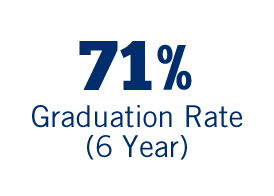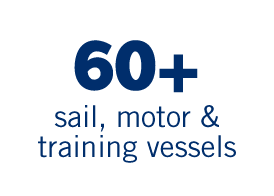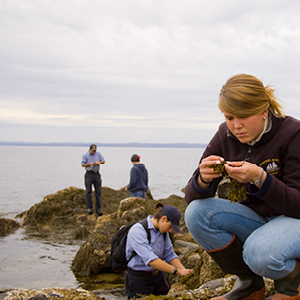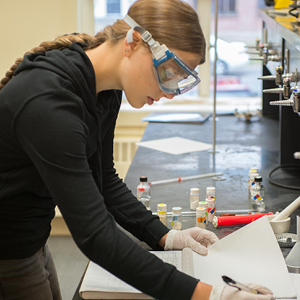Maine Maritime Academy
A COLLEGE OF ENGINEERING, MANAGEMENT, SCIENCE, AND TRANSPORTATION
Marine Biology
|Bachelor's DegreeBring your love of the ocean and your desire to study and preserve marine life to the marine biology degree program at Maine Maritime Academy. Our location on Castine Harbor provides the ultimate setting to become a marine biologist. From day one, you’ll have hands-on learning experiences in labs, on research vessels, and at nearby field sites, all of which will give you a solid foundation for a career in marine biology.
Through the marine biology degree program you’ll learn from, and work alongside, experienced faculty. These experts and mentors will share their love of science, teaching, and learning with you. They will help you build the critical knowledge and skills you need for marine biology degree jobs, from aquarist to fisheries biologist and researcher to science teacher — or to continue your scientific studies at the graduate level.



Ideal Location
Maine Maritime Academy’s location on Castine Harbor on the upper Penobscot Bay is the ideal setting to earn a marine biology degree. Unlike some marine biology college programs, you won’t have to wait to experience life as a marine biologist. Early in your education you can explore and conduct research, collect and identify flora and fauna, and immerse yourself in laboratory investigations. In addition to Castine Harbor, you’ll have access to field sites, such as Holbrook Island, rocky intertidal shores, local estuaries, salt marshes, and mud flats for exploration and research.
Dual Major Option
If you want to work in the marine biology field and have an interest in operating small vessels, consider the marine biology and small vessel operations dual major option. Through this 5-year degree path, you’ll learn how to safely handle and navigate small vessels. You’ll also prepare to test for a U. S. Coast Guard license, up to 200 gross tons, operating in near-coastal waters up to 200 miles offshore. Expand your career opportunities and make yourself more marketable as a marine biologist with this unique dual major option.
NECHE-Accredited
The marine biology degree at Maine Maritime Academy is accredited by the New England Commission of Higher Education (NECHE), a non-profit, non-governmental membership organization. With this regionally recognized standard in accreditation you can be sure you’re receiving a quality education.
Student Perspective

What Is Marine Biology?
From the start of your marine biology degree coursework at Maine Maritime Academy, you’ll experience what it’s like to be a marine biologist who works on the water with live organisms. With a focus on the interconnections and interactions of ocean animals, seaweeds, and microbes, the marine biology degree program at Maine Maritime Academy prepares you for a broad range of careers and graduate schools.
Specialized laboratories and vessels
As a marine biology major at Maine Maritime Academy you’ll use first-rate cellular/molecular laboratory equipment, such as dissecting and compound light microscopes, gel electrophoresis, and a thermocycler for PCR. You’ll also have access to boats, such as the research vessel Friendship, that are unparalleled by other marine biology colleges. You’ll gain practical sea time and the skills to observe, identify, make predictions, and experiment with ocean organisms through this marine biology degree.
Technical, hands-on experience
You’ll be immediately immersed in laboratory courses, including field surveys, collections and identification of local flora and fauna, and investigations into marine organism physiology. You’ll gain field experience at places such as the Maine State Aquarium, Boothbay Sea and Science Center, Marine Mammals of Maine, and the Clearwater Aquarium. If you pursue the dual major option, you’ll complete 120 sea days on appropriate vessels and through laboratories, simulation, cooperative work experiences, and a 14-day training cruise aboard the schooner Bowdoin.
Regiment of Midshipmen
The Regiment of Midshipmen, a uniformed student body dedicated to leadership, honor, integrity, discipline, and comradery, is a unique part of Maine Maritime Academy. While your participation isn’t required as a marine biology major, some students choose to join the optional Regiment to gain the self-confidence, self-discipline, leadership abilities, and teamwork skills that are highly valued by employers.
What Can You Do With A Degree in Marine Biology?
Graduates of the marine biology degree program at Maine Maritime Academy go on to work as specialists at aquariums, aquarists, fisheries biologists, marine resource technicians, secondary school science teachers, researchers, laboratory managers, and hydrographers. They are employed at state and federal agencies, such as the National Oceanic and Atmospheric Administration (NOAA) and the Maine Department of Marine Resources. They also work in animal health, aquaculture, and aquarium/husbandry, and earn advanced degrees at graduate or veterinary school.
Career outlook for marine biology majors
Employment of zoologists and wildlife biologists, which includes marine biologists, is projected to grow 5 percent through 2028, according to the U.S. Bureau of Labor Statistics.
How much do marine biology graduates make?
The median annual wage for zoologists and wildlife biologists, which includes marine biologists, was $63,420 in May 2018, according to the U.S. Bureau of Labor Statistics.
Alumni Perspective

Explore Classes for Marine Biology Majors
The marine biology degree at Maine Maritime Academy focuses on essential biology, including biology, ecology, physiology, cell biology, and genetics, and more specialized topics relevant to the study of marine organisms. This well-rounded marine biology degree will include courses in the arts and sciences with a focus on tools for clear and efficient communication.
- General Biology I
- Chemistry I
- Composition
- Introduction to Marine Science
- General Biology II
- Chemistry II
- Humanities I
- Calculus I
- OS Seminar I
- Any PE Course
- Any Swim PE Course
- Marine Botany
- Intro to Organic Chemistry
- Calculus II
- OS Seminar II
- Technical Physics
- Marine Zoology
- OS Seminar II
- Design & Applied Stat in Science
- Marine Geochemistry
- Technical Phsyics III
- Any PE Course (2)
- Ecology
- Marine Organism Physiology
- Physical Oceanography
- OS Seminar IV
- Any BI or OS Course
- Cell Biology
- Seminar V
- Prep for Research in Marine Science
- Any BI or OS Course
- Any EC,HC, HMSS, HY or PY Course
- Humanities II
- OS Seminar VI
- Research Project
- Any Course
- Any Course EC,HC, HMSS, HY or PY Course
- Genetics
- Any Course (2)
- Any EC,HC, HMSS, HY or PY Course
View all courses for the marine biology major.
Explore Classes for Marine Biology and SVO Dual Majors
The Marine Biology/Small Vessel Operations dual major allows the student to complete all of the requirements for the Bachelor of Science degree in Marine Biology and Small Vessel Operations, as well as a USCG license as mate of vessels not more than 200 gross tons, Near Coastal (200 miles offshore). This program in marine biology science may be completed in 5 years and is designed for students who plan to work in the marine biology field and may need the capability to operate small vessels.
- General Biology I
- Chemistry I
- Pre-Calculus
- Introduction to Oceanography & Environmental Science
- First Year Experience
- Seminar 0
- Ocean Survival
- General Biology II
- Chemistry II
- Calculus
- Composition
- Seminar 1
- Marine Botany
- Intro to Organic Chemistry
- Humanities I
- Intro to Nautical Science
- Hum/SS Elective
- Seminar II
- Basic Sailing
- USCG Firefighting
- Marine Zoology
- Chemical Oceanography
- Design & Applied Statistics
- Tech Physics I
- Seminar III
- USCG Firefighting Live Burn
- Lifeboat Exam
- Marine Organism Physiology
- Ecology
- Physical Oceanography
- Tech Physics III
- Seminar IV
- Intro to Vessel Operations
- Research Prep
- Cell Biology
- Dept/Program Elective
- Dept/Program Elective
- Seamanship
- Seminar V
- Research
- Humanities II
- Hum-SS Elective
- Seminar VI
- Small Craft Technology
- Small Craft Construction
- Genetics
- Dept/Program Elective
- Free Elective
- Free Elective
- Free Elective
- SVO Co-op
- Cargo I
- Marine System
- Terrestrial Navigation
- Terrestrial Navigation Lab
- SVO Dept. Elective
- Meteorology
- Navigation Rules
- Electronic Navigation
- Electronic Navigation Lab
- Topics in Small Vessel Operations
- 200 Ton License Seminar
View all Marine Biology and small vessel operations courses.
Department Faculty
Get Started on Your Bachelor’s Degree in Marine Biology
Take the next step toward earning your marine biology degree at Maine Maritime Academy.
Contact an Admissions Representative
If you’re ready for a hands-on marine biology degree that leads to a career in marine biology, please contact an admissions representative at Maine Maritime Academy.
Rated Military Friendly®
Maine Maritime Academy welcomes veterans and has the resources in place to help you transition to student life. Please contact our dedicated admissions representative for veterans.
Transfer
Maine Maritime Academy welcomes motivated and academically qualified transfer students. Please contact our admissions office to learn more about transferring to Maine Maritime Academy.
Apply Now and Request More Information
We invite you to start your application or request more information about the marine biology major at Maine Maritime Academy.











All Rights Reserved © 2025 • Web issue?
Non-Discrimination Notice • Privacy Policy & GDPR